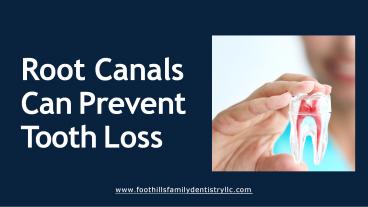Root Canal Details - PowerPoint PPT Presentation
Title:
Root Canal Details
Description:
Call us or contact us using the form we’ve provided to schedule a consultation and find out if a root canal treatment in Tucson is the answer to your tooth pain. – PowerPoint PPT presentation
Number of Views:11
Title: Root Canal Details
1
Root Canals Can Prevent Tooth Loss
www.foothillsfamilydentistryllc.com
2
What Is a Root Canal?
A root canal is a dental procedure that involves
removing the infected inner parts of the tooth.
Sometimes, decay or injuries can lead to
infected tooth pulp. The pulp supplies nutrients
to the tooth and ensures it remains viable. When
the pulp has been compromised, tooth death can
occur rapidly, and the infection can spread.
3
The Benefits of Root Canals
- A root canal can relieve the unrelenting pain of
a severe infection or inflamed tissues. - Root canals help to stop the spread of infection
and damage that can lead to tooth loss. - This procedure is more efficient than a tooth
extraction. - When a root canal treatment is coupled with a
crown, the results are aesthetically pleasing. - Many patients are surprised to learn root canals
are less expensive than the full tooth
extraction process, which often involves multiple
appointments and procedures. - Most dental insurance policies cover root canal
procedures.
4
How Do You Know If You Need a Root Canal?
Those who see their dentist regularly will be
monitored for signs of problems with the health
of their teeth. If issues arise in between dental
visits, patients need to look for the
following. Severe pain that occurs when chewing
or biting down Blistering, swelling, or pus
drainage on the gums Ongoing sensitivity that
does not dim Darkening of the gum tissue around a
tooth Worsening decay that runs deep into the
tooth
5
How to Care for Your Tooth After a Root Canal
It is important to follow the instructions of the
dentist, to ensure proper healing. Some tips can
make recovery much easier for patients. Eat a
soft foods diet for the first few days so there
is no pressure on the healing tooth. Work
towards reducing the number of sugary drinks you
consume each day. Floss once a day, being
careful around the tooth that had the root
canal. Brush twice a day, using gentle motions
around the tooth.
6
Schedule an Appointment
Are you experiencing unrelenting pain or signs of
infection or decay? Schedule a dental
appointment right away. Waiting too long could
put your oral health in danger. Root canals
have come a long way since they were first
introduced in 1838. Today, advances in dental
science allow for a much more comfortable
procedure that offers beneficial results. Call
today to schedule an examination. With prompt
dental care, it is possible to save your tooth
and prevent ongoing damage, while stopping the
pain.
7
FOLLOW US































